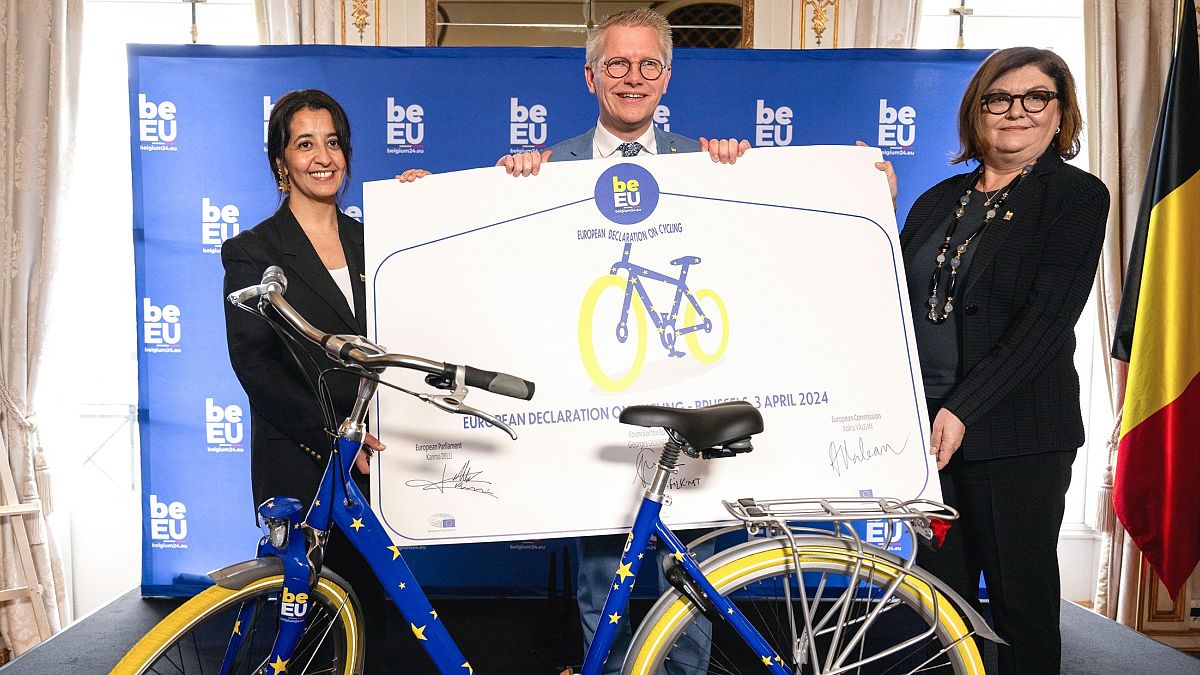Although it carries no legal force, cycling advocates have greeted an undertaking by governments and MEPs to make Europe a more bike friendly place as an important recognition of the health and environmental benefits and a milestone in EU transport policy.
Cycling is “one of the most sustainable, healthy and efficient” ways to cut greenhouse gas emissions, EU governments have agreed as they committed to build more cycle lanes and secure parking places, improve safety for riders, and promote schemes to encourage a switch from four wheels to two.
The undertaking is part of a European Declaration on Cycling signed in Brussels on Wednesday (3 April) during a gathering of transport ministers organised by Belgium, which currently chairs intergovernmental talks as holder of the rotating EU Council presidency.
Governments commit to “significantly increasing safe and coherent cycling infrastructure across Europe” and increasing safely for cyclists, “in particular by physical separation of cycle paths from motorised traffic where relevant, or by ensuring safe speeds in mixed traffic”.
The European Cyclists’ Federation welcomed the declaration. “Today, we celebrate…a truly historic achievement,” the advocacy group’s director Jill Warren said. “This declaration holds the potential to unlock the benefits of cycling for millions of European citizens.”
The declaration was also endorsed by the European Parliament, which had called early last year for the EU executive to develop a dedicated cycling strategy with the aim of doubling the number of kilometres cycled across the union by 2030.
Also contributing to the momentum generated by a surge in cycling and the deployment of cycle routes during the covid pandemic, pro-cycling EU member states Belgium, Luxembourg, Austria, Ireland, Denmark and the Netherlands produced their own declaration in 2022. They were subsequently joined by another ten, including France and Spain.
The European Commission followed up last October with the draft text for a joint EU declaration. The text signed by all three EU institutions this week did not go as far as the parliament had wanted, with no concrete targets and no legal obligations, but was nonetheless hailed as a “an important step” by Belgian deputy prime minister Georges Gilkinet.
“The declaration was the first ever European level text setting out a general policy on cycling,” Gilkinet, who also serves as Belgium’s mobility minister, told reporters today (4 April) at the end of the two-day ministerial meeting that he chaired. “For the first time, the bicycle is recognised as an element of mobility policy at the European level,” he said.
Transport Commissioner Adina Valean, who signed on behalf of the EU executive, said implementation of the undertakings set out in the declaration were a matter for governments and regions “who choose to do so”.
She stressed, however, that the Commission had sought to promote cycling through other pieces of legislation, such as a recently adopted law on passengers rights which requires train operators to provide spaces for bicycle transport.
The ministerial summit also yielded a Brussels Declaration on “the mobility of tomorrow”, which, as well as echoing the main points of the agreement on cycling, also called on the next Commission to make “the modal shift towards rail transport a central objective of European mobility policy”.

